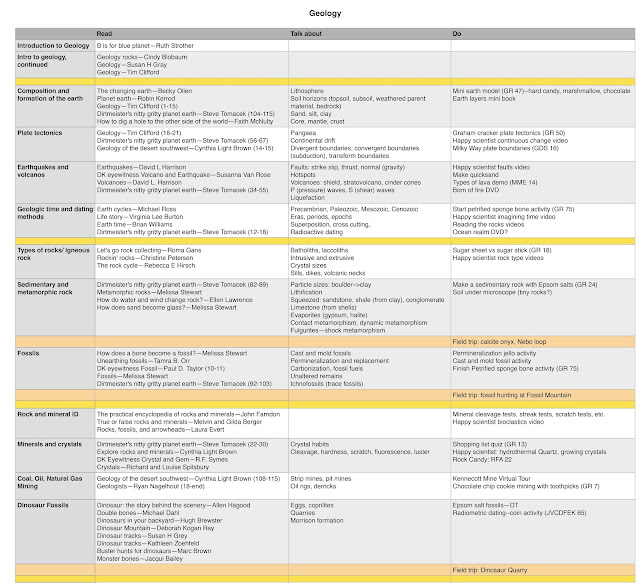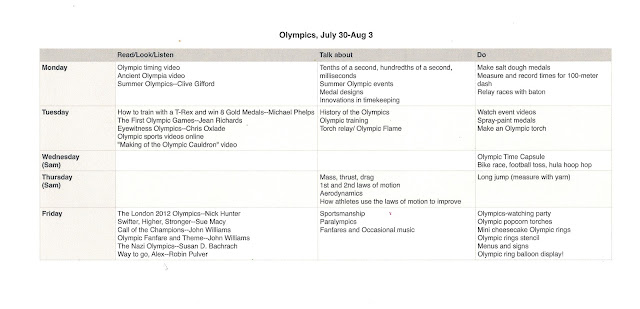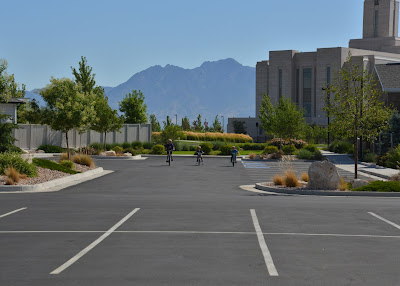In the past few years I've talked to lots of people who are wondering about homeschooling. I'm going to excerpt from an email I wrote to a friend a while ago, telling how I go about preparing Unit Studies. If you are curious, I hope it helps you! But don't be alarmed by how long it is. I was just trying to be thorough!
*****
Yes. I understand the desire to know, in detail, HOW other people do things! Before we started homeschooling, I asked everyone I knew how they went about their lesson preparation! And it frustrated me how many of them gave vague answers like you mentioned: "Oh, just do what works best for you; you'll figure it out." Or, "Just be guided by the children's passions." I wanted to grab them by the lapels and shout, "But how, EXACTLY, did you know what to do? What if you FORGET to teach some key concept and it RUINS EVERYTHING? Don't you realize that if I homeschool I will be SOLELY AND COMPLETELY AND PERSONALLY responsible for every single thing that my children need to know for the rest of their lives?!?!"
Ha! So…I totally understand the panic that can bubble up. And in fact, I still feel that same panic sometimes when I look to the future. It's just really hard to visualize how you will best meet the unknown future needs of your unknown future older-kids, people you don't even know yet. So of course it's stressful to think about it!
But, now that we've been at this a few years, I also understand why people were saying "Oh it's simple, just do what works for you!"—because that's true too. It turned out, when I actually did find people who would give me specifics, I often ended up thinking, "well, THAT system sounds unnecessarily complicated." Or "that sounds too simplistic!" Or "if I did that, it would take me months to prepare one lesson!" Or "what's the point of doing that; it's just like regular school!" So, after all, I DID sort of need to end up finding my own method that worked for me, and so does everyone. There's trial and error involved. I'll try to describe more specifically about what I do, but just be warned that it may not be helpful to everyone—you might say "That doesn't sound simple to ME!" or whatever. :)

The Unit Studies method is great because it has tons of room for flexibility. You can be really methodical about it, like one of my friends who has a four-year science cycle: chemistry, physics, biology, and…something. She's very deliberate about it. Her history is on a cycle like that too (ancient world, Medieval and Renaissance, modern era and civil rights, etc. Can't remember exactly). My style of haphazard units would freak some people out! But for my part, I realized soon after starting this that all the necessary principles are interconnected, and they will come up as needed, even if I just pick more random/focused subjects to study! Without even trying to, we have covered all the subjects that the state covers—just in different order and starting from different units (and, usually, more in-depth). So, for example, we did a unit on Fireworks, which Seb was fascinated with at the time. You have to do chemistry to explain chemical reactions: What makes fire burn? What are compounds? All that stuff. We did the Solar System for Malachi, who loves space. So of course: the earth and the moon, cycles of the moon, gravity. We did an Olympics unit. Also Football. Had to discuss Newton's laws, forces and motion, why big things have more momentum, etc. We did Volcanoes. Composition of the earth, how rocks are formed, continental drift, tectonic plates. Another year we did Natural Disasters, so more review of the volcano stuff, plus weather patterns, clouds, ice and the water cycle, geologic stuff like plate movement and waves, etc. We did Nuclear Energy because my boys BEGGED for it (after we visited the nuclear museum on a trip to New Mexico). I was dreading it because I am definitely not smart enough to understand it (I thought). But I just checked out a million books from juvenile non-fiction (science books for kids are awesome) on nuclear power, nuclear weapons, nuclear power plants, etc. And pretty soon it made sense. And to understand it, you have to talk about the periodic table, atoms, how atoms combine to make molecules, the forces in the universe, movement of electrons, etc. But all that stuff is in the books too. So by "randomly" choosing subjects, I feel fine about the science they are getting. And if they are a bit young for it (Ky was only 1st grade for Nuclear Power, so I'm sure he didn't get it all) that's fine, they will get another exposure to the same subjects in another unit—as he did when we later did Electricity or Light and Optics, etc. You can also always look up what the public schools in your state are teaching each year, if you need ideas.
For us, I like starting with an overall unit (to give the subject relevance—so I've found that "Nuclear Energy" is a more interesting starting point than "the structure of atoms," though both teach the same underlying principles. But I have also done more broad units like "Rocks and Minerals" or "Water." Even with those, though, I try to work in some culture and history throughout the unit, like, "worldwide myths featuring water" or "how minerals are used in modern technology" or "how wave pools and water parks work" or whatever). I choose our units based on
1. Kid interest (e.g. Architecture for Seb, penguins for Daisy)
2. My interest (e.g. Shakespeare, the Nervous system)
3. I feel vaguely like it should be learned at some point (e.g. Rocks and minerals)
4. I remember I learned it in school, or I know it's in the state standards (e.g. Solar system)
5. Current event (e.g. Babies and reproduction)
6. Local opportunity/field trip/ exhibit (e.g. Chocolate, when there was a chocolate exhibit at the natural history museum)
Remember I've only been at this for four years, but so far I've been trying to pick one human body system per year, one big history unit or war, and maybe a country to study in-depth each year too. And then a roughly equal balance of science and history for the rest (though often, science and history overlap, like when you learn the history of how the science was discovered, or what scientific advancements made certain parts of history possible, like WWI and the machine gun). Sometimes around the kids' birthdays I let them pick a unit (Abe was into Magic a couple years ago, so we did a unit on Illusion and talked about optical illusions, chemistry "magic tricks," some history of theater illusions, make-up, special effects, sound engineering effects in movies, etc). The rest is just picked by me, and I get ideas all over the place (as listed above, or I can always browse state education websites or grade-level specific websites for further ideas).

I may be giving you way too much information. I'm just trying so hard not to give you that "you'll figure it out" answer! I'm trying to give you actual details. Hopefully it's not making you feel more overwhelmed. But honestly, it's just because it takes forever to type it out. For our units, the process is basically:
- Make an outline of units for the year, on a calendar, guessing how many weeks each unit needs, approximately (can be changed later).
- Browse county library website in juvenile Non-Fiction by subject. (Using related words also. So like when we started a Light and Optics unit, I looked up "light" which had several pages to go through. Picked the books that were moderate-length so they'd be simpler, and looked interesting. That gave me more ideas of subjects to look up, like fiberoptics. Lasers. Electric light. Thomas Edison. Light and dark. Shadows. The sun. Energy. Telescopes. Lenses. Reflection. Refraction. Looked up all those and picked the most interesting books.) Put them on hold. You can do 20 books per card and I sometimes use all our cards :)
- Get books, take them home, page through them briefly. Discard ones that are boring or too repetitive. Some repetition is good, though. Start to figure out subdivisions for units and see if I need any more books (like do I need something on atomic structure? If there is not a good book on lasers, do I need to look up on the internet, "how lasers work?" "Lasers for kids"?)
- Look at calendar and plan out days. I need a day each for the subjects of reflection, refraction, lenses, telescopes, microscopes, rainbows, colors, shadows, at least. Some are longer days; those can't go on piano lesson/choir days. I better start with a couple days review on the electromagnetic spectrum and how electrons orbit the atom, even though we learned that in our electricity unit. Any field trips? Look for free days that can fit those in.
- What books go with each day? Put on spreadsheet.
- Activities. Don't need something every day, but there are plenty. Browse Pinterest, blogs, websites. Look up "light unit for kids." "Light activities for kids" "Color activities for 4th grade." "Kindergarten study about colors" Etc. Put activities on spreadsheet. Some are simple, like coloring something. Others are more complex: make your own periscope. Make supply list if necessary. Does this craft sound FUN and SIMPLE and CHEAP? If not, find something else. Other supplies needed, like a microscope, I might have already, or I might consider ordering if I think we'll use it a lot. We need a prism for this unit. Maybe a laser pointer? Lenses—see if we have some old ones from old glasses or sunglasses. Do I know anyone that can help us with this? My brother was an astronomy major; email him for ideas. My neighbor is a chemist; maybe he has a magnifying glass we can borrow? What about my uncle who worked for Boeing? Maybe he can explain how airplanes use radar and light scanners. I wonder if Sam can get us into the BYU planetarium. The guy in the office next to Sam's is a theater lighting guy, maybe he can show us how theater lighting works for a field trip? Check websites for museum exhibits coming up. Email the Salt Lake astronomy club. Etc etc etc. I shamelessly use everyone I know as a resource, or email people I find online. We have found some awesome opportunities that way.
- Unit is planned. Will take 5 weeks. Now I don't really need to do anything except check my spreadsheet every night, make sure I have supplies or I read up on specifics (what is radar, again?) online to make sure I can explain it. Plenty of "radar for dummies"-type resources online. Also lots of good videos on YouTube, Netflix, PBS.org, etc.
- A few weeks later, repeat process for next unit.
These steps can take me a couple of weeks, working on free evenings or on Saturdays/ Sundays, but it isn't really that overwhelming; it's not like I'm doing lesson prep all the time. And once a unit is mostly outlined, like I said, I'm not working on it every night or anything.
It's seriously so simple, and it's really fun (for me). But if it's not fun for you, you can order pre-made curriculum online! You can get a whole science curriculum for the year, and then just add to it or customize it—spending more time on the subjects your kids like best. Or find individual units on something your kids like. Or join a co-op, or sign up for an online course, or free videos, or just simplify it way down and use lesson plans on the Utah education website. There are so many ways to do it! So don't let knowing MY specifics freak you out! :)
You could do it! You'd be great. Nothing to be afraid of. Some figuring out and adjustments, sure, but you're doing that in parenting all the time. This is no different.























































